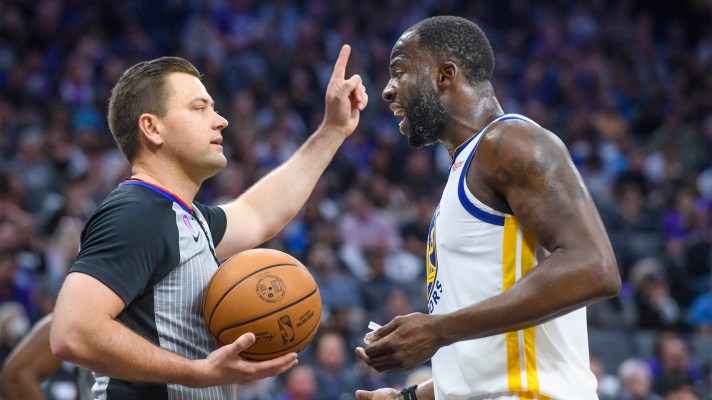Sports
Busting 4 Major Myths About Referees In The NBA Playoffs – FiveThirtyEight

NBA Playoffs
By Ben Dowsett
Randall Benton / AP Photo
The NBA playoffs come with an intensified microscope on everyone, referees maybe most of all.
Typically an afterthought (with some exceptions) during the regular season, NBA officials tend to be thrust into the limelight in the spring. Seemingly every postseason comes with a new incident or think piece on the sad state of NBA officiating. Fans learn the names of refs they’d barely registered the existence of until recently.
Most of this is innocent enough. NBA officials don’t mind the “heel” role they’re destined to play on social media or the inevitable boos when a home crowd feels wronged. Hell, some might even say acting irrationally about officials is part of being a sports fan(atic). But sometimes these conversations become more serious — such as when prominent players publicly raise issues about player-ref relationships and the quality of league officiating.
When that happens, several major misconceptions tend to seep in, and they’re worth unpacking as the most intense part of the season kicks into gear.
Myth No. 1: “Refs should be perfect!”
High-level basketball is impossible to officiate perfectly. It’s a far more dynamic game than, say, baseball, where nearly every decision is black-and-white in nature — there’s more subjectivity and gray area than any other major sport.
Even casual fans are likely aware of this, but may not grasp the basic arithmetic at play.
RECOMMENDED
Culture
What Are The Chances Of Serving On A Jury?
Read Now
Recommended
What Are The Chances Of Serving On A Jury?
What Americans Think Of The Biden Impeachment Inquiry
The Second GOP Debate Could Be Smaller, With Or Without Trump
A typical NBA game features 500 to 550 material calls (or non-calls) made by the officiating crew, per sources within the NBA’s referee grading program.I detailed last season.
And some of those 25 will invariably occur at more important moments than others. “You can’t miss a call in that spot” is a common refrain from frustrated parties, but think about it for a moment: If officials could simply will themselves into never missing in high-leverage spots, wouldn’t they just do that for all situations instead?
None of this makes missed calls — especially the more obvious-looking ones — any less frustrating when they happen during a key sequence of a tense playoff contest. No one likes their team being disadvantaged by factors outside players’ control.
Broadly, though, accepting that misses are part of the game makes handling their inevitable occurrence a bit easier.
Myth No. 2: “Refs aren’t held accountable for errors!”
This one is a straight-up falsehood, sadly perpetuated by some media members in addition to casual fans.2
The reality: NBA refs are graded on every single decision by third-party evaluators. Those grades, as I also reported on last season, are a major factor in who gets promotions to crew chief roles, salary increases and playoff assignments (which carry further financial bonuses). Refs are sometimes fined for misapplication of rules; those who consistently fall below league standards are dismissed.
Some feel this accountability should be more public in nature, which is a fair position — though one with some nuance involved.3 Internally, though, tying financial outcomes directly to performance is about as good an example of accountability as one can find.
Myth No. 3: “The NBA assigned (insert ref name — usually Scott Foster) to a game on purpose to lengthen the series!”
Likely the most common implication among the NBA’s tinfoil-hat-wearers is this one: That in response to a couple of early blowouts in a series, the league will assign one of its “fixers” to guarantee the underdog a victory and, therefore, secure extra games and increased revenue.
A bit of logistics, per multiple league sources: Officiating crews are pre-assigned for Games 1 through 4 of every NBA playoff series ahead of time, in part to avoid criticisms just like this. Refs also are paid by the playoff round they reach,4 rather than by the game — so even if an official calls only one game in a given round, they receive the full bonus for that round. Again, this is so there’s zero incentive, conscious or subconscious, for a ref to do anything but call a game straight.
True conspiracy theorists are perhaps undeterred by this news; because the league is forced to assign refs on a game-by-game basis later in a series, they could still dictate outcomes!
But at the risk of giving this nonsense more attention than it deserves, the idea that a profitable and public sports entity would risk its entire legitimacy and a league-altering scandal for a few extra million here or there through any meansstar players preferential treatment, lengthening series, etc.
Let’s move on.
Myth No. 4: “(Team X) shot way more free throws than (Team Y) in that game — surely there’s something afoot!”
Quite the opposite, in fact.
Well over a decade ago, NBA officiating leadership moved away from the “game management” approach — that is, the idea that the rules are flexible depending on game situation or any other factor beyond whether or not an infraction took place. But there are many examples of misconceptions influenced by this thinking that still hang over the sport: That star players should be officiated differently purely based on status, not on merit; that certain calls should be whistled early in a game, but not if it’s close down the stretch; that a ref “owes” a team a call if the last several went against them; etc. Each is its own slippery slope toward bias and unfairness, and this myth is among their ilk.
In truth, call discrepancies mean refs are doing the job the right way. Some players and teams foul more than others! That should often be reflected in foul and free-throw totals.
The NBA’s officiating program, and its individual referees, are far from perfect. Legitimate critiques are an important part of improvement — but they’re tougher to discuss earnestly when faulty presumptions cloud the conversation.
But hey, if booing officials is your thing, boo away! They’ll live.
Check out our latest NBA predictions.
Which I detailed last season.
The latter can at least be excused for unintentional ignorance.
It’s also an area where conversations at the league level are ongoing, though no public release of grading data is likely anytime soon, I’m told.
Twelve referees make the Finals each year; 18 make the conference finals, and so on.
Whether that be favoring big markets, giving star players preferential treatment, lengthening series, etc.
Ben Dowsett is a writer and videographer based in Salt Lake City. His past NBA work can be found at ESPN, GQ, The Athletic and elsewhere. @Ben_Dowsett
Filed under
NBA (1152 posts) Basketball (355) NBA Playoffs (281) Referees (10) NBA Refs (4)
NBA Playoffs
NBA Playoffs
NBA
NBA
Impeachment
2024 Republican Debates
2024 Election
2024 Election
© 2023 ABC News Internet Ventures. All rights reserved.









